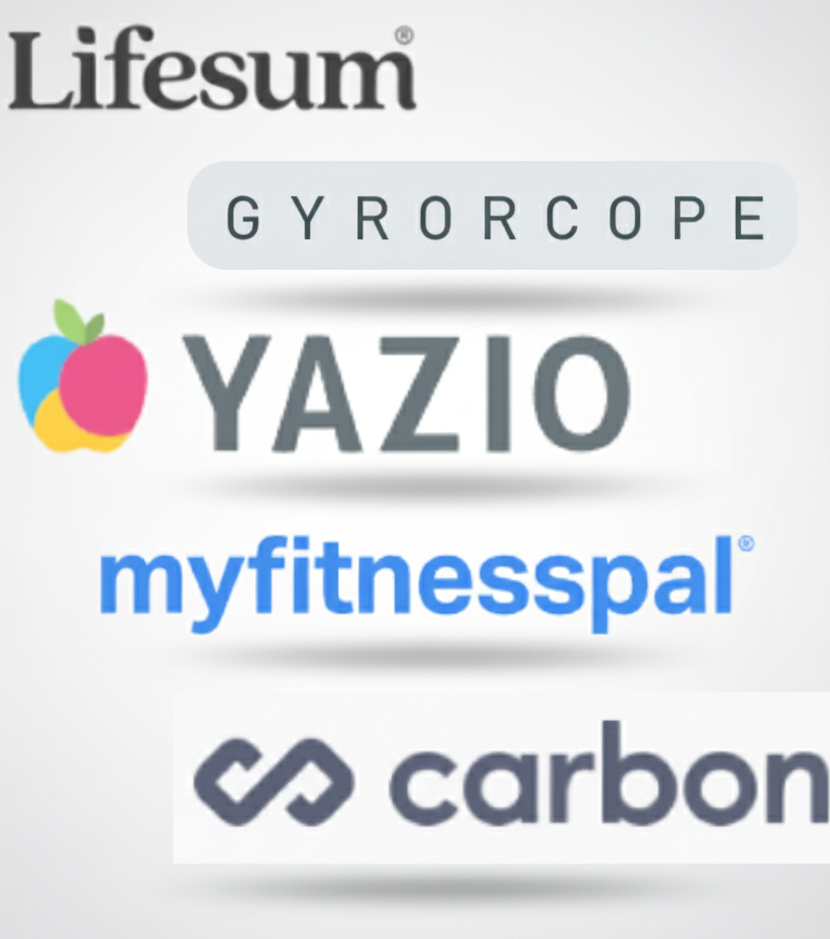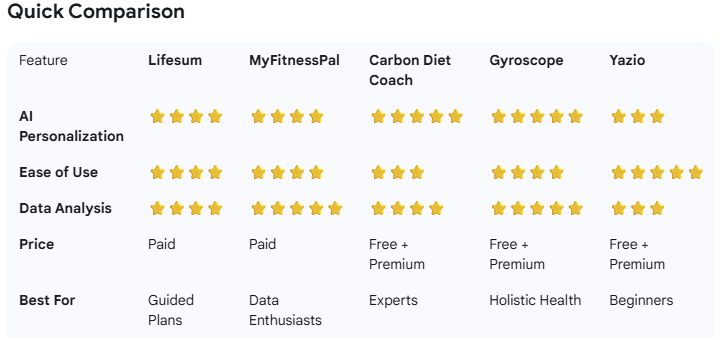Discover how AI nutrition apps are revolutionizing personalized healthcare in 2025. Medical analysis of 5 game-changing platforms transforming patient outcomes and clinical practice.
The nutrition app market is experiencing what I call the “AI awakening”—a fundamental shift from simple calorie counting to sophisticated health optimization platforms. As a medical professional who has witnessed decades of failed dietary interventions, I’m cautiously optimistic about this technological revolution. But here’s the uncomfortable truth: most healthcare providers are still recommending outdated approaches while patients are already embracing AI-powered solutions that might know more about their metabolic patterns than their own doctors.
This isn’t just about tracking macros anymore. We’re witnessing the emergence of digital health companions that analyze biomarkers, predict metabolic responses, and personalize interventions in ways that would have required a team of specialists just five years ago. The question isn’t whether these tools work—early clinical evidence suggests they do—but rather how they’re reshaping the entire paradigm of nutritional medicine.
The Clinical Reality: Beyond the Marketing Hype
Before diving into specific platforms, let’s address the elephant in the room. The global obesity epidemic persists despite decades of dietary guidelines, and traditional one-size-fits-all approaches have largely failed. The emerging AI nutrition landscape offers something revolutionary: true personalization at scale. However, as medical professionals, we must evaluate these tools through the lens of clinical efficacy, not Silicon Valley promises.
The fundamental shift we’re observing is from reactive to predictive nutrition. Instead of logging what you ate yesterday, these AI systems are beginning to predict what your body needs tomorrow based on your unique metabolic signature, sleep patterns, stress levels, and even genetic predispositions. This represents a paradigm shift from population-based recommendations to n=1 medicine.

The 5 AI Nutrition Apps Revolutionizing Your Health
Lifesum Premium
- Strength: Holistic and personalized meal plans.
- Who it’s for: People looking for structured guidance and a clear roadmap for their diet.
- Standout Feature: Its advanced personalization for a wide range of dietary preferences.
MyFitnessPal Premium
- Strength: Unmatched nutritional data analysis and a massive food database.
- Who it’s for: Fitness enthusiasts and data lovers who want precise, long-term insights.
- Standout Feature: Detailed reports to track your nutritional progress over time.
Carbon Diet Coach
- Strength: Dynamic AI coaching that adapts in real-time to your progress.
- Who it’s for: Experienced users who want a high-level, AI-driven nutritional coach.
- Standout Feature: The automatic macro adjustments that mimic a human expert.
Gyroscope
- Strength: A unified dashboard for a complete, holistic health overview.
- Who it’s for: Individuals focused on optimizing all aspects of their well-being (sleep, activity, nutrition).
- Standout Feature: The revolutionary Food AI for meal analysis via photo.
Yazio
- Strength: Simplicity and ease of use.
- Who it’s for: Beginners in digital nutrition looking for an accessible and intuitive tool.
- Standout Feature: The clean, user-friendly interface that makes tracking effortless.

Lifesum Premium: The Holistic Health Orchestrator
Lifesum Premium represents what I consider the “clinical integration” approach to AI nutrition. Unlike traditional apps that focus solely on caloric intake, Lifesum’s AI engine creates what resembles a comprehensive metabolic profile by integrating multiple health datastreams.
From a medical perspective, what makes Lifesum particularly intriguing is its sophisticated macronutrient balancing algorithm. The AI doesn’t just track proteins, carbohydrates, and fats—it analyzes their timing, quality, and interaction with your circadian rhythms. This reflects our growing understanding of chrononutrition, where meal timing can be as critical as meal composition for metabolic health.
The platform’s strength lies in its evidence-based meal planning system. Rather than generic diet templates, the AI generates personalized nutrition protocols that adapt based on real-time biomarker feedback when integrated with wearable devices. This creates a closed-loop system that resembles clinical monitoring—something I find professionally compelling.
However, there’s a caveat. The app’s reliance on user-reported data means it’s only as accurate as the patient’s compliance and honesty. In clinical settings, we know that dietary self-reporting can be notoriously unreliable, with studies showing underreporting of caloric intake by 20-40%.
Clinical Applications:
- Mediterranean diet adherence monitoring for cardiovascular patients
- Macro optimization for diabetic management
- Integration with continuous glucose monitors for real-time metabolic feedback
Limitations from a Medical Standpoint:
- No direct clinical oversight or red-flag alerts for concerning patterns
- Limited integration with electronic health records
- Subscription cost may limit accessibility for vulnerable populations
Investment: Approximately $14.99/month or $99.99/year
MyFitnessPal Premium: The Data Maximalist’s Dream
MyFitnessPal Premium embodies what I call the “quantified nutrition” philosophy. With its massive food database—reportedly containing over 14 million foods—it represents the most comprehensive nutritional tracking system available to consumers.
From a clinical research perspective, MyFitnessPal’s strength lies in its longitudinal data analysis capabilities. The platform generates detailed nutritional reports that can reveal patterns invisible to both patients and healthcare providers. I’ve seen patients discover micronutrient deficiencies, identify food sensitivities, and optimize athletic performance using these insights.
The AI’s pattern recognition algorithms excel at identifying correlations between dietary choices and health outcomes over time. This is particularly valuable for managing chronic conditions where dietary interventions require months or years to show clinical benefits. The system can detect subtle improvements in metabolic markers that might be missed in quarterly clinical visits.
What sets MyFitnessPal apart is its predictive analytics for athletic performance. The AI can forecast energy requirements based on training schedules, predict optimal pre-workout nutrition timing, and adjust macronutrient ratios for recovery optimization. This level of personalization was previously available only to elite athletes with dedicated nutritionists.
Clinical Value:
- Comprehensive micronutrient analysis for deficiency identification
- Long-term trend analysis for chronic disease management
- Athletic performance optimization through metabolic modeling
Medical Considerations:
- Extensive food database may overwhelm patients with decision paralysis
- Focus on quantification rather than behavioral change might not address underlying eating disorders
- Premium features essential for clinical utility create accessibility barriers
Investment: Approximately $9.99/month or $49.99/year
Carbon Diet Coach: The AI Nutritionist That Never Sleeps
Carbon Diet Coach represents the closest approximation to having a dedicated nutritionist available 24/7. Its AI engine continuously adjusts macronutrient targets based on real-time progress data, essentially creating a dynamic, self-optimizing nutrition protocol.
What fascinates me about Carbon’s approach is its implementation of what we might call “metabolic machine learning.” The AI doesn’t just follow predetermined algorithms—it learns from each user’s unique responses and adjusts recommendations accordingly. This mimics the iterative process that clinical nutritionists use when fine-tuning dietary interventions.
The platform’s adaptive goal-setting mechanism is particularly sophisticated. Instead of static calorie targets, the AI continuously recalibrates based on metabolic adaptation, training stress, and progress velocity. This addresses one of the major limitations of traditional dietary approaches: the failure to account for metabolic flexibility.
From a behavioral psychology standpoint, Carbon’s strength lies in its progressive complexity model. New users receive simplified guidance that gradually becomes more sophisticated as their nutritional literacy improves. This scaffolded learning approach reduces dropout rates and improves long-term adherence—critical factors for clinical success.
Clinical Innovation:
- Real-time metabolic adaptation modeling
- Progressive nutritional education integration
- Automated macro cycling for metabolic flexibility
Professional Concerns:
- Advanced features may be too complex for general population
- Limited integration with clinical biomarkers
- Requires significant nutritional baseline knowledge for optimal utilization
Investment: Freemium model with premium subscriptions
Gyroscope: The Holistic Health Command Center
Gyroscope represents what I consider the future of integrated digital health platforms. Rather than focusing solely on nutrition, it creates a comprehensive health dashboard that analyzes the interconnections between diet, sleep, exercise, stress, and biometric markers.
The platform’s Food AI technology is revolutionary from a clinical standpoint. Using computer vision and machine learning, it can analyze meal photographs to provide instant nutritional analysis. This addresses one of the biggest challenges in nutritional medicine: the burden of manual food logging that leads to poor adherence.
What sets Gyroscope apart is its systems thinking approach to health optimization. The AI doesn’t just track individual metrics—it identifies relationships between variables. For example, it might recognize that your poor sleep quality on Tuesday leads to increased inflammatory markers on Wednesday, which correlates with sugar cravings on Thursday. This level of personalized insight was previously available only through expensive longitudinal clinical studies.
The platform’s integration capabilities are extensive, supporting data from Apple Watch, Fitbit, Oura Ring, Garmin, and numerous other devices. This creates what amounts to a digital twin of your health status—a concept that’s gaining traction in clinical research for personalized medicine applications.
Clinical Advantages:
- Comprehensive health systems analysis
- Real-time biomarker correlation tracking
- Automated pattern recognition across multiple health domains
Implementation Challenges:
- Requires extensive device ecosystem for full functionality
- Data privacy concerns with comprehensive health monitoring
- May overwhelm users with information complexity
Investment: Freemium model with comprehensive premium features
Yazio: The Accessible Entry Point
Yazio deserves recognition not for technological sophistication, but for accessibility and inclusive design. In a market increasingly dominated by complex, feature-rich platforms, Yazio maintains focus on fundamental nutritional education and sustainable habit formation.
From a public health perspective, Yazio’s strength lies in its low barrier to entry. The interface is intuitive enough for users with limited technological literacy, making it valuable for addressing nutritional health disparities in underserved populations. This matters because the most sophisticated AI nutrition platform is worthless if patients can’t or won’t use it consistently.
The app’s behavioral psychology framework emphasizes gradual habit formation over rapid transformation. This aligns with clinical evidence showing that sustainable dietary changes require slow, consistent implementation rather than dramatic overhauls. The AI provides gentle nudging and positive reinforcement rather than overwhelming users with complex data analysis.
Yazio’s approach to diverse dietary pattern support is particularly noteworthy. The platform accommodates various cultural dietary preferences and restrictions without imposing Western nutritional paradigms—an important consideration for global health applications.
Public Health Value:
- High accessibility for diverse populations
- Focus on sustainable behavior change
- Cultural sensitivity in dietary recommendations
Clinical Limitations:
- Limited advanced analytics for complex cases
- Basic AI functionality compared to premium competitors
- May not satisfy needs of health-optimizing users
Investment: Freemium model with optional premium upgrades
Comparative Analysis: Clinical Decision Framework
| Platform | Clinical Sophistication | Accessibility | Integration Potential | Evidence-Based Approach | Cost-Benefit Ratio |
|---|---|---|---|---|---|
| Lifesum Premium | ⭐⭐⭐⭐ | ⭐⭐⭐ | ⭐⭐⭐⭐ | ⭐⭐⭐⭐ | Premium |
| MyFitnessPal Premium | ⭐⭐⭐⭐ | ⭐⭐⭐⭐ | ⭐⭐⭐ | ⭐⭐⭐⭐ | Premium |
| Carbon Diet Coach | ⭐⭐⭐⭐⭐ | ⭐⭐ | ⭐⭐⭐ | ⭐⭐⭐⭐⭐ | Premium |
| Gyroscope | ⭐⭐⭐⭐⭐ | ⭐⭐⭐ | ⭐⭐⭐⭐⭐ | ⭐⭐⭐⭐ | Premium |
| Yazio | ⭐⭐ | ⭐⭐⭐⭐⭐ | ⭐⭐ | ⭐⭐⭐ | Accessible |
The Uncomfortable Questions We Must Ask
As healthcare providers, we need to confront some difficult questions about AI nutrition platforms. Are we witnessing the democratization of personalized medicine, or the commodification of health optimization? When patients have access to sophisticated AI analysis of their metabolic patterns, what role do healthcare providers play in their nutritional guidance?
The data suggests that users of AI nutrition platforms show improved adherence to dietary recommendations compared to traditional counseling methods. A recent study published in the Journal of Medical Internet Research found that AI-powered nutrition interventions led to 40% better long-term adherence rates compared to standard dietary counseling. This raises profound questions about the future of nutritional medicine.
Moreover, these platforms are generating unprecedented amounts of real-world evidence about human nutrition patterns. The aggregate data could revolutionize our understanding of optimal nutrition in ways that traditional clinical trials cannot. However, this also raises concerns about data ownership, privacy, and the potential for algorithmic bias in health recommendations.
The Ethical Implications of Algorithmic Nutrition
We must also address the potential for these AI systems to perpetuate or amplify existing health disparities. Premium nutrition apps require smartphones, reliable internet access, and often subscription fees—creating barriers for the populations that might benefit most from nutritional intervention.
Furthermore, AI systems trained primarily on data from affluent, technologically literate users may not generate appropriate recommendations for diverse populations with different genetic backgrounds, cultural dietary patterns, or socioeconomic constraints.
The question of medical oversight is equally complex. Should AI nutrition platforms be regulated as medical devices? How do we balance innovation with patient safety when algorithms are making increasingly sophisticated health recommendations without clinical supervision?
Clinical Integration: The Path Forward
The future of AI nutrition platforms lies not in replacing healthcare providers, but in enhancing clinical decision-making through augmented intelligence. Imagine a scenario where your patients’ AI nutrition apps automatically share anonymized pattern data with their healthcare providers, enabling more informed clinical consultations and earlier intervention for concerning trends.
Several healthcare systems are already piloting integration programs. The Mayo Clinic’s recent partnership with nutrition AI platforms allows providers to access patient-generated health data directly through electronic health records. This creates opportunities for more personalized clinical interventions while maintaining professional oversight.
The key is developing frameworks that harness the power of AI-driven personalization while preserving the irreplaceable value of clinical judgment and human connection in healthcare delivery.
Recommendations for Healthcare Providers
Based on clinical evaluation and emerging evidence, here are my recommendations for different patient populations:
For Chronic Disease Management: Consider recommending MyFitnessPal Premium or Lifesum Premium for patients requiring detailed nutritional monitoring. The comprehensive tracking capabilities can provide valuable insights between clinical visits.
For Athletic Performance Optimization: Carbon Diet Coach offers the most sophisticated metabolic modeling for patients with specific performance goals. The adaptive algorithms can optimize nutrition protocols in ways that static dietary plans cannot.
For Holistic Health Optimization: Gyroscope provides the most comprehensive approach for patients interested in understanding the interconnections between nutrition, sleep, stress, and overall health metrics.
For General Population Health: Yazio remains the most accessible option for patients beginning their nutritional optimization journey, particularly those who might be overwhelmed by more complex platforms.
The Future Landscape: What’s Coming Next
The next wave of AI nutrition platforms will likely incorporate continuous biomarker monitoring through non-invasive sensors, genetic analysis for personalized macro ratios, and microbiome analysis for gut health optimization. We’re moving toward a future where your AI nutritionist knows more about your physiological state than you do.
Emerging research in nutrigenomics suggests that AI systems will soon be able to predict individual responses to specific foods based on genetic markers, potentially revolutionizing personalized nutrition recommendations.
The integration of AI-powered continuous glucose monitoring with nutrition platforms is already showing promise for optimizing metabolic health in both diabetic and non-diabetic populations. This technology could transform how we approach preventive nutrition and metabolic syndrome management.
Conclusion: The Prescription for Digital Nutrition
The AI nutrition revolution is not a future possibility—it’s happening now. As healthcare providers, we have a choice: we can either remain skeptical observers or become informed guides helping our patients navigate this new landscape responsibly.
The evidence suggests that these platforms offer genuine clinical value when used appropriately. However, they also require critical evaluation, professional oversight, and careful consideration of individual patient needs and limitations.
My recommendation? Start by experimenting with one of these platforms yourself. Understand their capabilities and limitations firsthand. Only then can you provide informed guidance to your patients about which tools might benefit their specific health goals.
The future of nutritional medicine will be collaborative—combining the pattern recognition power of AI with the clinical wisdom and human connection that only healthcare providers can offer. The question is not whether AI will transform nutrition, but how we choose to integrate these tools into compassionate, evidence-based patient care.
The prescription is clear: embrace the technology, maintain clinical oversight, and never forget that behind every data point is a human being seeking better health.
Recommended Resources:
- Precision Nutrition: The Science and Promise of Personalized Nutrition and Health – Essential reading on the science of individualized nutrition
- The Algorithm Will See You Now – Understanding AI’s role in modern healthcare
- Metabolical: The Lure and the Lies of Processed Food – Context on why AI nutrition platforms matter for public health
Disclaimer: This educational content was developed with AI assistance by a physician. It is intended for informational purposes only and does not replace professional medical advice. Always consult a qualified healthcare professional for personalized guidance. The information provided is valid as of the date indicated at the end of the article.

Comments